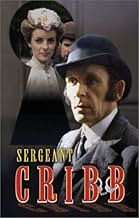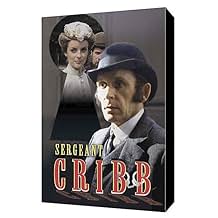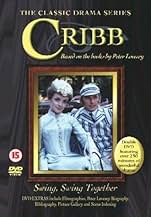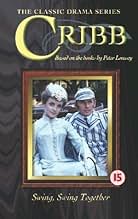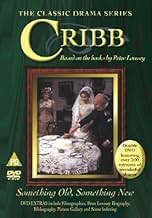The Victorian era cases of Detective Sergeant Cribb of Scotland Yard's newly formed Criminal Investigation Department.The Victorian era cases of Detective Sergeant Cribb of Scotland Yard's newly formed Criminal Investigation Department.The Victorian era cases of Detective Sergeant Cribb of Scotland Yard's newly formed Criminal Investigation Department.
Browse episodes
Storyline
Featured review
Peter Lovesey's Victorian Detective
Detective Sgt. Cribb and Constable Thackeray, his associate, are the equivalent in Peter Lovesey's first series of novels of Sherlock Holmes and Dr. Watson. But unlike Conan Doyle's heroes, Lovesey used his characters to look closely at the mores and ideas of the period from 1870 to 1896. Doyle could not quite do this, because he was writing in that period and simply took the trappings as normal. Lovesey looks at the period at how the world of late Victorians was different from ours.
Take WAXWORKS, which is the first of the novels to be turned into a series (for "Mystery" on Channel 13). The novel looks at how Victorian homicides made killers "celebrities" (a trend that still continues), and that one particular trial has gone beyond the norm: the defendant, a woman, did not mount much of a defense on the charge of poisoning a photographer. But after her conviction, evidence mounts suggesting that the defendant's husband and a lover may have better knowledge of what happened, and who really was the poisoner. In the meantime, amidst the hullabaloo of the trial and possible appeal, Lovesey brings in the world of Madame Tussaud's Wax Museum (hence the title) and it's "Chambre of Horrors". They intend to have two new figures in the coming season. One is the woman who is now under sentence of death. The other is the noted English hangman/executioner, James Berry. We see Berry several times in the course of the story, looking pleased with his gaining ultimate fame (his figure will be immortalized at Tussaud's) and he, by hanging the woman, will be giving her immortality as well.
SWING, SWING TOGETHER deals with the events of 1889, where a corpse has turned up on the Thames near Oxford. Was the murder committed by a local Don Juan Oxford Don, who was a suspect in the Ripper case of the previous year, or was it done by one of three men on a vacation on a boating trip? The latter brings in another phenomenon of 1888-89: the popular novel THREE MEN IN A BOAT by Jerome K. Jerome is spoofed several times by Cribb and Thackeray, copying the various misadventures of the heroes of the story. The story also includes a look at the "model" prisons of the age in Britain.
INVITATION TO A DYNAMITE PARTY was about the events (about 1885) when the Fenians were financing an Irish - American inventor to create the ultimate tool against the English. They were financing the "Fenian Ram", an early submarine - the inventor was John Philip Holland, the father of the modern working submarine. In reality financial arguments prevented Holland and the Fenians from working together to the completion of the project, but in the story another Irish patriot has completed such a weapon, and plans to use it against England's mightiest battleship.
I wish the series was shown again. It brought out all aspects of British social and political problems in the guise of mystery stories. THE DETECTIVE WORE SILK DRAWERS was about illegal bare knuckle pugilism. ABRACADAVER was about the salacious after hour music hall performances, and Victorian fondness for magic shows. A CASE OF SPIRITS was about the search for the paranormal that swept 19th Century Europe and America. With Alan Dobie's Cribb and William Simons' Thackeray, they brought a nice sense of humor to the parts, as did their superior, David Waller as the pompous and snobby Superintendent Jowitt. Waller usually was just a break on Cribb's attempts to get really deeply into matters affecting the status quo, but in one or two episodes he was allowed to get entwined into a mystery (one where he returns to a reunion of his minor public school he attended). Waller was a limited actor, but here he shown pretty nicely.
Take WAXWORKS, which is the first of the novels to be turned into a series (for "Mystery" on Channel 13). The novel looks at how Victorian homicides made killers "celebrities" (a trend that still continues), and that one particular trial has gone beyond the norm: the defendant, a woman, did not mount much of a defense on the charge of poisoning a photographer. But after her conviction, evidence mounts suggesting that the defendant's husband and a lover may have better knowledge of what happened, and who really was the poisoner. In the meantime, amidst the hullabaloo of the trial and possible appeal, Lovesey brings in the world of Madame Tussaud's Wax Museum (hence the title) and it's "Chambre of Horrors". They intend to have two new figures in the coming season. One is the woman who is now under sentence of death. The other is the noted English hangman/executioner, James Berry. We see Berry several times in the course of the story, looking pleased with his gaining ultimate fame (his figure will be immortalized at Tussaud's) and he, by hanging the woman, will be giving her immortality as well.
SWING, SWING TOGETHER deals with the events of 1889, where a corpse has turned up on the Thames near Oxford. Was the murder committed by a local Don Juan Oxford Don, who was a suspect in the Ripper case of the previous year, or was it done by one of three men on a vacation on a boating trip? The latter brings in another phenomenon of 1888-89: the popular novel THREE MEN IN A BOAT by Jerome K. Jerome is spoofed several times by Cribb and Thackeray, copying the various misadventures of the heroes of the story. The story also includes a look at the "model" prisons of the age in Britain.
INVITATION TO A DYNAMITE PARTY was about the events (about 1885) when the Fenians were financing an Irish - American inventor to create the ultimate tool against the English. They were financing the "Fenian Ram", an early submarine - the inventor was John Philip Holland, the father of the modern working submarine. In reality financial arguments prevented Holland and the Fenians from working together to the completion of the project, but in the story another Irish patriot has completed such a weapon, and plans to use it against England's mightiest battleship.
I wish the series was shown again. It brought out all aspects of British social and political problems in the guise of mystery stories. THE DETECTIVE WORE SILK DRAWERS was about illegal bare knuckle pugilism. ABRACADAVER was about the salacious after hour music hall performances, and Victorian fondness for magic shows. A CASE OF SPIRITS was about the search for the paranormal that swept 19th Century Europe and America. With Alan Dobie's Cribb and William Simons' Thackeray, they brought a nice sense of humor to the parts, as did their superior, David Waller as the pompous and snobby Superintendent Jowitt. Waller usually was just a break on Cribb's attempts to get really deeply into matters affecting the status quo, but in one or two episodes he was allowed to get entwined into a mystery (one where he returns to a reunion of his minor public school he attended). Waller was a limited actor, but here he shown pretty nicely.
- theowinthrop
- Nov 26, 2005
- Permalink
Details
- Release date
- Country of origin
- Language
- Also known as
- Υπόθεση Κριμπ
- Production company
- See more company credits at IMDbPro
Contribute to this page
Suggest an edit or add missing content


